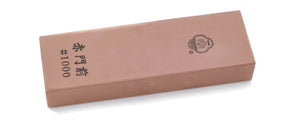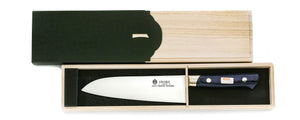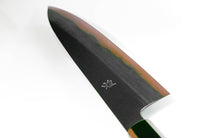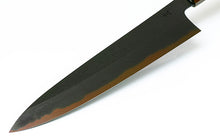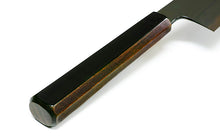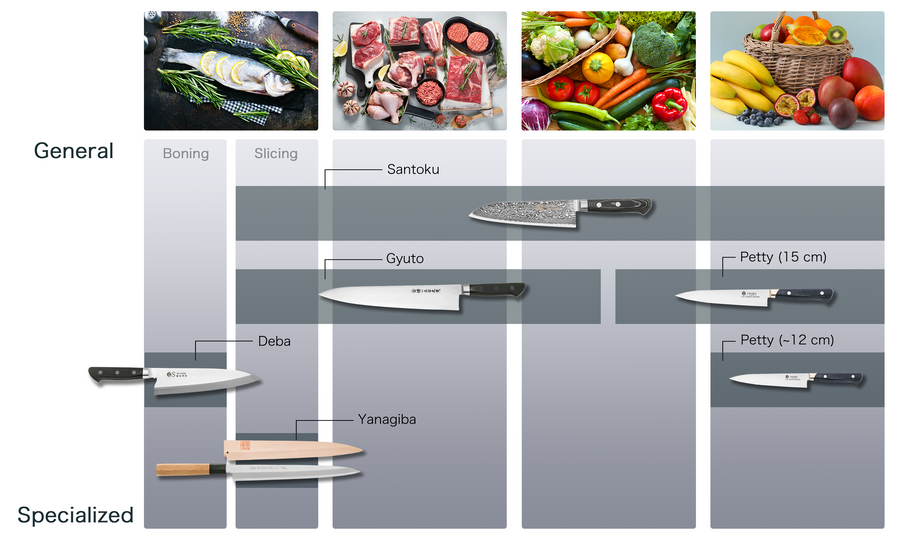
Black Coating High-Carbon Steel Japanese Handle Style Chef Knife
- Blue Steel 1 with Damascus Pattern
- Japanese style handle with Urushi lacquer, Japanese traditional craft.
- The blade is dyed black on the surface by a special process.
- Be Forged welded to take full advantage of the material and edged to bring out its hardness and toughness.
| Product number | Actual Blade Length (mm) | Full Length (mm) | Total Weight (g) |
|---|---|---|---|
| 1kcz-240 | 226 | 380 | 178 |
| Blade | Material Name | Handle |
|---|---|---|

Double Edged |
Blue Steel #1 | Urushi Finish Handle |

Wa-Gyuto
A Wa-Gyuto Chef's Knife is a French-style chef's knife fitted to a Japanese-style handle, familiar to traditional Japanese chefs. These handles are often Octagonal, D-shaped (Chestnut-type), or Round (Circle-type). Wa-Gyuto knives are all-purpose and made for meat, vegetables, and fish. This makes them a popular choice for chefs in Western restaurants throughout Japan. For preparing meat blocks or cutting cabbage into strips, a 300mm Wa-Gyuto is best. 270mm also works for cooking if the cutting board is large enough. 240mm is popular with professionals, as it handles tasks from preparation to delicate work. 180mm and 210mm are popular for home use, as they cut through large pieces of food without much strain.
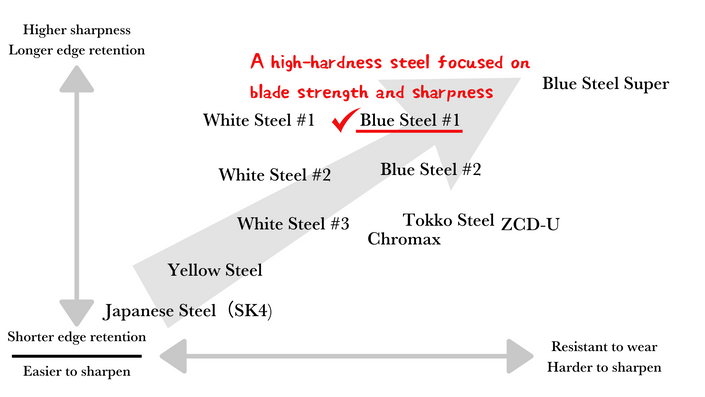
Blue Steel #1
A harder version of Blue Steel #2. While chip-resistant with amazing edge retention, you need to know how to sharpen properly to use it.
Carbon Steel
Blue Steel #1 is a higher carbon version of Blue Steel #2, and thus a harder steel. Both Blue Steels are made by adding trace amounts of tungsten and alloy carbides (both for hardness), and chromium (for toughness and rust resistance) to White Steel, creating a very tightly bonded alloy steel. The higher carbon levels in Blue Steel #1 increase hardness levels even further, leading to better sharpness and edge retention. We recommend Blue Steel #1 to those who want a premium cutting experience, but also need a knife that stays sharp for a long time. This is truly a steel for professionals.
*NOTE: Carbon Steel is susceptible to rust if it is not properly cared for. Please clean and dry the blade regularly during use and after use.
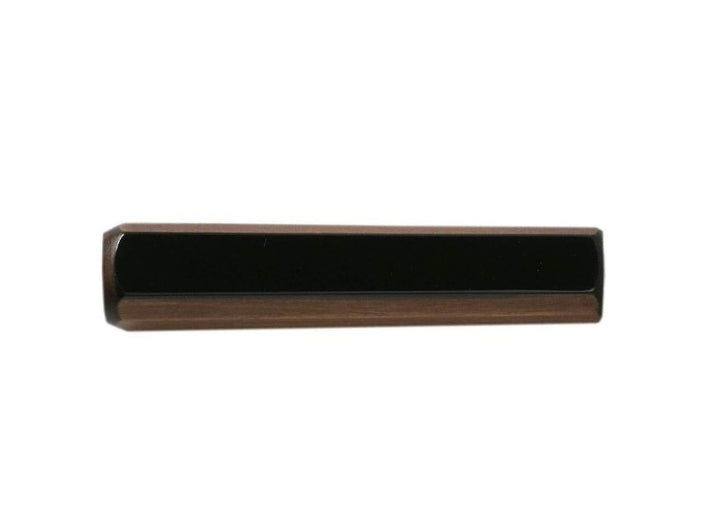
Kuroro Urushi Finish Handle
Kuroro refers to the deep, beautiful, and glossy color of black lacquer. This kind of lacquer is also known as urushi and is used for "urushi finishing", a traditional Japanese coating technique inherited for thousands of years. The octagonal handle is fully coated with a thin layer of raw lacquer to make the wood grain stand out beautifully as a base canvas. Two sides of the handle are then coated with multiple layers of kuroro lacquer, with polishing done in between to give the lacquered surface a mirror-like luster. The striking power behind kuroro lacquer gives it a stunning, high-contrast appearance. This lacquer style is much more resistant to water, and less prone to damage than ordinary wooden handles.
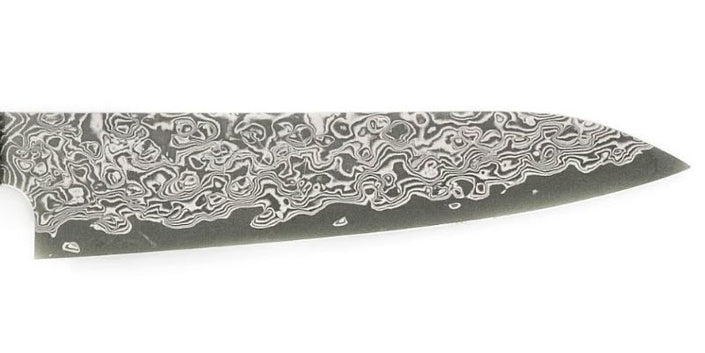
Damascus
Damascus is a knifemaking technique. It involves layering two types of steel with different hardness levels together to create a unique pattern. The knife is polished after it's shaped, making the harder steel shiny while leaving the softer steel dull, creating a ripple effect that resembles wood grain on the blade's surface. The ripples resemble the ripples of Wootz steel made in ancient Damascus, so the pattern is referred to as Damascus today. This beautiful pattern has garnered a high reputation and is popular in the kitchen knife community.

Optional Engraving
Optional Engraving Service
Sakai Ichimonji provides complimentary engraving using either Japanese Kanji or English Alphabet. Please specify your preference. For details, please visit here
A knife store that has supported the history of knives and food culture in Japan.
It has been 600 years since the birth of swordmaking in the Sakai region of Japan. Sakai Ichimonji Mitsuhide's and it's craftsmen continue to build on that legacy by producing the finest blades in Japan.
This is where the culture of completing a dish of sashimi by "just cutting" and the culture of expressing sharpness as "taste" was born.
For 70 years, we have been connecting the spirit of Sakai's craftsmen with the passion of chefs in Osaka's kitchen equipment shopping district, known as the kitchen of Japan.
We are very happy that our knives can be used by people all over the world.
Precautions
After use, wash off any dirt and wipe thoroughly with a dry cloth to remove any moisture. This product is not for use with frozen foods.This product is handmade, so each piece will be different. Please use the weight and length listed as a guide. Each material is natural and may vary in color. It is not the same as the picture.We take great care with our inventory, but in the unlikely event that we are out of stock, we will contact you by email to let you know.



























